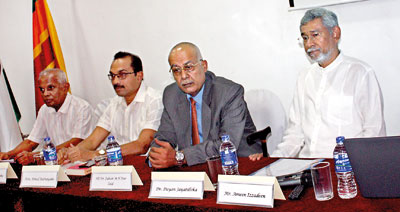Sunday Times 2
Govt. urged to take principled stand on Palestinian cause
View(s):
The panellists from left: Journalist Mahinda Hattaka, JVP frontliner Bimal Rathnayake, Palestine Ambassador Zuhair Zaid and former Ambassador Dayan Jayatilleke. Below: A section of the audience. Pix by Nilan Maligaspe
Sri Lanka should reassert its support for the Palestinian cause was the call at a panel discussion held on Wednesday in Colombo.
The panel discussion saw Jantha Vimukthi Peramuna’s former Parliamentarian Bimal Rathnayake, former Ambassador Dayan Jayatilleke, veteran international affairs journalist Mahinda Hattaka and guest speaker and Palestine Ambassador Zuhair Zaid dismissing the US president Donald Trump’s Middle East peace plan as not worth the paper it was written on.
They endorsed the view that Mr. Trump’s deal was dead on arrival.
The panel discussion, jointly hosted by the Sri Lanka Committee for Solidarity with Palestine and the Sri Lanka Journalists for Global Justice, was held at the Sri Lanka Foundation Institute.
Dr. Zaid was vociferous when he said no Palestinians would accept Mr. Trump’s so-called peace plan. Neither would any Arab state endorse it. He said the plan sought to legalise the illegal activities Israel had been carrying out in occupied Palestine.
He said the Trump plan was just another attempt at creating an exclusive Jewish state in Palestine, just as the 1917 Balfour declaration, the 1936 Peel Commission and the 1947 UN partition resolution.
The ambassador said the Palestinians were willing to go for one-state solution, if the two-state solution was problematic, but that one state should be an inclusive state, not exclusive to the Jews. He warned that if the Palestinians’ hope in the peace process was not restored, it could lead to extremism.
He expressed confidence that support for the Palestinian cause would be enhanced under the present Sri Lankan, especially after a new government was formed following the April 25 general elections.
Former parliamentarian Rathnayake, who was a member of the Parliament’s Sectoral Oversight Committee on International Relations, questioned whether Mr. Trump was morally qualified to talk peace or make peace when he himself had done much harm to the Palestinian people by withdrawing US assistance to Palestinian relief fund.
He said the peace plan was aimed at not peace but legitimizing the crimes Israel had been committing since it occupied Palestinian territories in 1948. He said the US-Israeli strategy was to oust the Palestinians from Palestine.
“We should resist this colonial project,” Mr. Rathnayake said.
The JVP frontliner said Sri Lanka should follow a policy of isolating Israel at international events in a bid to make the Zionist state know that what it was doing in Palestine was incorrect.
He said Sri Lankans who support the Palestinian cause must write to the Sri Lanka-headed UN Special Committee on Israeli Practices in Palestine, highlighting Israeli violations.
He also called on the government to be more vocal in its expression of solidarity with the Palestinian cause.
Ambassador Jayatilleke said Sri Lanka’s neutral foreign policy did not mean it could remain silent on world issues. He referred to Prime Minister S.W.R.D. Bandaranaike’s statement at the UN in 1956, qualifying Sri Lanka’s neutrality.
Mr. Bandaranaike said Sri Lanka’s neutrality did not mean the country was uncommitted, blissfully indifferent to issues and it was isolating itself. The then premier said, “We are committed to the hilt… we are committed to the cause of justice and of freedom as much as anyone is…”
Dr. Jayatilleke said Non-Alignment was no neutrality; the non-aligned policy on neutrality was clear as clarified by Mr. Bandaranaike.
 Dr. Jayatilleke asked whether Sri Lanka should remain neutral or follow the neutrality defined by the NAM in extending its unwavering support to the Palestinian struggle, the oldest and the most outstanding world issue.
Dr. Jayatilleke asked whether Sri Lanka should remain neutral or follow the neutrality defined by the NAM in extending its unwavering support to the Palestinian struggle, the oldest and the most outstanding world issue.
He reminded the audience that Sri Lanka during the presidency of Ranasinghe Premadasa and Cuba were the only non-Arab or non-Islamic nation that opposed the 1991 UN resolution that sought to revoke the 1975 resolution describing Zionism as a form of racism. The revocation was pushed by the then sole superpower the United States.
He also recalled Sri Lanka’s support for the Palestine’s membership in the UNESCO and how he as Sri Lanka’s ambassador campaigned for it in 2011.
Commenting on Mr. Trump’s peace plan, he said it was a result of an ideological coronavirus spreading across the political establishments of many countries, though it was not as rapid as the virus that had taken more than 3,000 lives and affected more than 90,000 people.
The ideological coronavirus he referred to was the rise and spread of rightwing racist political thought. He pointed out this virus had affected the US, Israel, Brazil and several countries.
It dovetailed with US-based Christian fundamentalists or Christian Zionists, who were a major support base of President Trump, he said. In this ideologically propelled coronavirus affected thought process, Palestine does not exist, Dr. Jayatilleke said.
He said the Trump peace plan was aimed at creating more extremism and further destablising the region.
He expressed the hope that the new government to be set up under the premiership of Mahinda Rajapaksa would reassert Sri Lanka’s traditional position with regard to Palestine and would take a principled stand.
Journalist Hattaka, who is the president of the Sri Lanka Journalists for Global Justice, said Mr. Trump’s plan was part of a sinister design to assert the US’s world domination. He said agreements such as SOFA and ACSA were also part of this big plan and therefore, Sri Lanka should be wary of those who offered free gifts.

